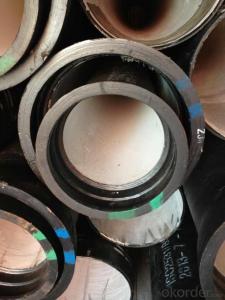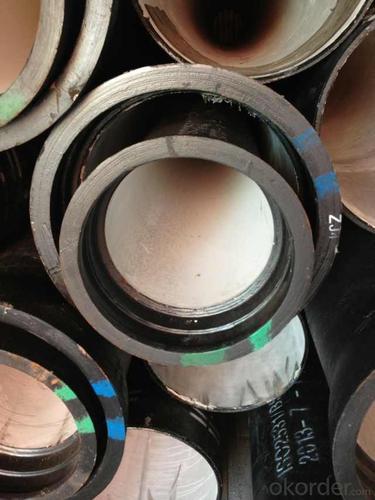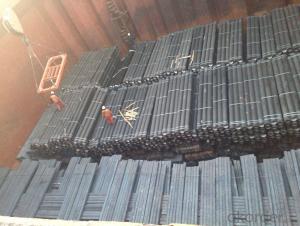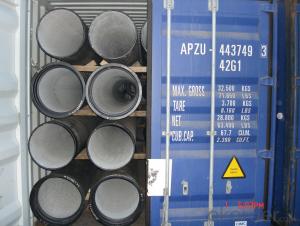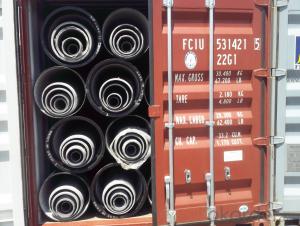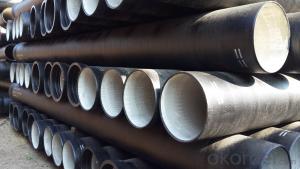DUCTILE IRON PIPE C DN350
- Loading Port:
- Tianjin
- Payment Terms:
- TT OR LC
- Min Order Qty:
- -
- Supply Capability:
- 30000Tons m/month
OKorder Service Pledge
OKorder Financial Service
You Might Also Like
CNBM ductile iron pipe ranges from DN80-DN1600mm (T-Type, Class K9), effective length 6m, comply with ISO2531 Standard
Company Profile
CNBM International Corporation is the leading production base and renowned supplier of Ductile Iron Water Pipe systems of both potable and waste water in China. We are constantly looking to develop high quality products to ensure the longest service life and wonderful performance.
CNBM Pipelines regard quality as the essential factor leading to successful business. Every pipe is tested in accordance with BS EN545 (water application) or BS EN598 (sewer application). CNBM Pipelines products comply with and are tested according to the relevant European and International Standards. Our pipes are manufactured under the quality management system BS EN ISO 9001. After years of efforts, CNBM Pipelines has built up great reputation in terms of quality and service among customers worldwide
Product Introduction
CNBM ductile iron pipe ranges from DN80-DN1600mm (Tyton, T-Type, Class K7/K8/K9), effective length: 6m, complying with BS EN545/EN598/ISO2531/BS4772.
Specification& Payment terms
Internal lining: Pipes shall have an internal cement mortar lining in acc with ISO4179.
External coating: Pipes shall be externally coated with metallic zinc spray plus a further layer of resin painting to ISO8179.
Gasket: 100% SBR/NBR/EPDM gasket in accordance with ISO4633.
Packing: Pipes from DN100 to DN300 be bundled with steel belts, the others are in bulk.
Payment term: By 30% T/T advance payment + 70% Irrevocable L/C at sight.
Packing: In bulk vessel or in container.
- Q: What is the lifespan of ductile iron pipes?
- The durability and longevity of ductile iron pipes can vary depending on several factors, including pipe quality, installation conditions, and the surrounding environment. On average, these pipes typically last between 50 and 100 years, making them an excellent choice for water and sewer infrastructure. By implementing proper maintenance practices and conducting regular inspections, ductile iron pipes can remain highly functional and efficient for many decades. It should be noted that factors such as corrosion, soil conditions, and water chemistry can influence the lifespan of these pipes, so it is important to monitor and address these issues in order to extend their longevity.
- Q: What is the expected joint deflection capability of ductile iron pipes?
- The expected joint deflection capability of ductile iron pipes is typically around 2 to 5 degrees per joint, allowing for flexibility and accommodating slight changes in alignment during installation and operation.
- Q: Principles for the antiseptic treatment of ductile iron pipes
- The principle that the antiseptic treatment of ductile iron pipes must be complied with is that.1. internal and external surface coating shall be kept clean, remove rust and impurities2. after coating on the inside and outside surface, the coating should be even and smooth, firm and firm, and shall not be abnormal because of climate change3. coating for water delivery should be insoluble in water, no peculiar smell, harmful impurities content
- Q: Are ductile iron pipes suitable for use in saltwater environments?
- Yes, ductile iron pipes are suitable for use in saltwater environments. Ductile iron is highly resistant to corrosion and can withstand the corrosive effects of saltwater, making it a reliable choice for piping systems in such environments.
- Q: What's the function of the cement mortar lining of ductile iron pipes?
- In brief, the cement mortar lining system has the following advantages:1. provide active protection better than barrier coating2. meet both national and international standards for contact with potable water3. can be used in the strict requirements of the occasion4. strong and shock resistant5. suitable for a wide range of applications6. easy to repair7. over 100 years of service life
- Q: Do ductile iron pipes require concrete encasement for support?
- No, ductile iron pipes do not typically require concrete encasement for support. Ductile iron pipes have sufficient strength and flexibility to support their own weight and withstand typical loads without the need for additional concrete encasement.
- Q: What is the minimum cover requirement for ductile iron pipes?
- The minimum cover requirement for ductile iron pipes is typically determined by the specific project or engineering design considerations. However, as a general guideline, the minimum cover requirement for ductile iron pipes is often recommended to be at least 2 feet (or 0.6 meters) from the top of the pipe to the finished ground surface. This minimum cover requirement helps to provide adequate protection to the pipe from external loads, soil settlement, and potential damage from construction activities. It also helps to maintain the structural integrity and longevity of the ductile iron pipe system. It is important to note that local building codes, industry standards, and project specifications may dictate specific minimum cover requirements, so it is crucial to consult these resources for accurate and up-to-date information.
- Q: Can ductile iron pipes be used in contaminated soil conditions?
- Indeed, contaminated soil conditions pose no obstacle to the utilization of ductile iron pipes. Ductile iron boasts exceptional attributes such as robustness, endurance, and resistance to corrosion, rendering it appropriate for diverse soil conditions, even those tainted by chemicals or other harmful substances. The material's resistance to corrosion guarantees the pipes' ability to endure the adverse conditions and sustain their structural integrity throughout time. Nevertheless, it is crucial to take into account the nature and extent of soil contamination and seek guidance from specialists to ascertain whether supplementary protective measures or coatings are necessary to ensure the pipes' enduring efficiency.
- Q: Can ductile iron pipes be used for underground hydropower systems?
- Yes, ductile iron pipes can be used for underground hydropower systems. Ductile iron pipes are known for their strength and durability, making them suitable for various applications, including underground installations. They have excellent resistance to corrosion and can withstand high pressure, making them ideal for carrying water in hydropower systems. Ductile iron pipes also have a long lifespan, reducing the need for frequent replacements and minimizing maintenance costs. Additionally, they have good joint integrity, ensuring leak-free connections underground. Therefore, ductile iron pipes are a reliable choice for underground hydropower systems.
- Q: Are ductile iron pipes resistant to frost heave?
- Yes, ductile iron pipes are generally resistant to frost heave due to their strong and flexible nature.
Send your message to us
DUCTILE IRON PIPE C DN350
- Loading Port:
- Tianjin
- Payment Terms:
- TT OR LC
- Min Order Qty:
- -
- Supply Capability:
- 30000Tons m/month
OKorder Service Pledge
OKorder Financial Service
Similar products
Hot products
Hot Searches
Related keywords
